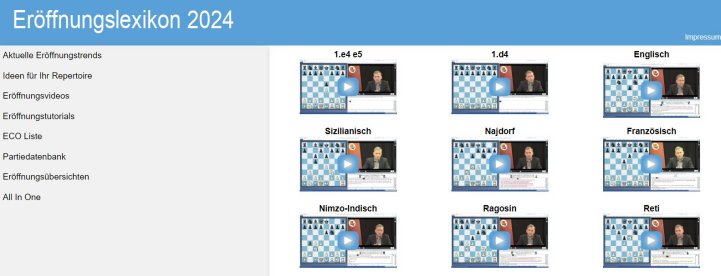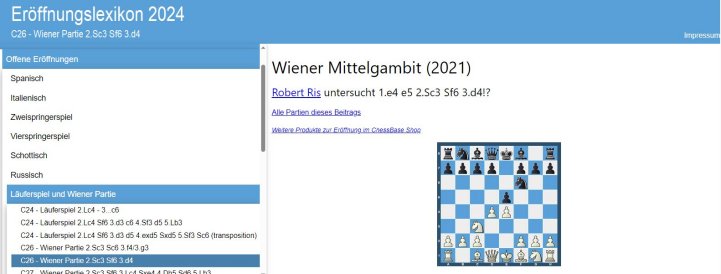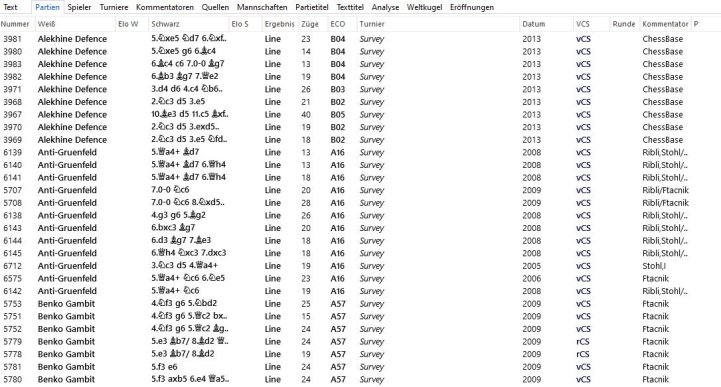.jpeg)

.jpeg)
The new ChessBase Opening Encyclopaedia 2024 - More content. More ideas.
At first glance, the sheer volume of openings, variations and sub-variants is impressive, to say the least. What the renowned authors, led by Thomas Stark and Dorian Rogozenco, have put together requires a great deal of attention to detail and a keen eye for the latest developments on the tournament scene.
An impressive 27 hours of video footage and countless variations and commentaries are presented in eight chapters. Some of these are aimed at professionals or strong amateurs who want to keep their repertoire up to date or add to it. Others are aimed at players of all levels. With the help of the ChessBase Opening Encyclopaedia they can make important progress in building an opening repertoire.
Dorian Rogozenco, the project's chess director and a former national coach, had already given an important all-clear in an interview: "As complicated as the openings may be, it's not about memorising variations, it's about understanding the openings. This can be achieved by watching videos and tutorials as well as real and ideally annotated games. An approach that is far more focused on pleasure than frustration".
Here is a brief introduction to the chapters.

The 2024 Opening Encyclopaedia starts with an important new feature: in ten videos, some of which are 15 to 20 minutes long, Rogozenco explains the relevant highlights of the last few months from an opening theory perspective. He takes a look at the top tournaments, starting with the Tata Steel tournament in Wijk aan Zee last year up to the January 2024 edition. All the new features of the encyclopaedia are based on this period and Rogozenco provides an impressive overview of the results from the grandmaster opening labs - whether 1.Nf3, 1.e4, 1.d4 or 1.c4. Below the videos you will find a link to the "complete list of opening developments since January 2023" and the diagrams for the videos, which you can use to jump directly to the detailed treatment of the respective variation in the chapter "Ideas for your repertoire": The first diagram, for example, deals with the Berlin Wall in the Spanish Defence and after clicking on it, you will be taken to Lars Schandorff's opening article from 2023. Below the diagrams, there are also links to opening videos of other lines, such as the Spanish with 5...Na5 by Mihail Marin.

As described above, you can access this chapter, which Thomas Stark describes as the "centrepiece" of the Opening Encyclopaedia, via the current opening trends or via the main navigation. Here the user has access to no less than 1463 repertoire suggestions!
To keep it clear, the encyclopaedia works with pull-down menus. Firstly, the openings are divided into open, semi-open, closed, semi-closed and flank openings. A click example from the open section runs as follows: Open Openings - Bishop's Openings and Vienna Game - C26 Vienna Game 2.Nc3 Nf6 3.d4 and it opens the page "Vienna Middle Gambit (2021)", in which Robert Ris examines the d4 variation.
Also worth mentioning is the year above the post. This is an innovation that makes it easier for the user to know the timeliness of the article. The games listed in the text can be opened in a new window, and in conjunction with the Mega Database, even more recent games can be found quickly.
At the end of the article, as in the CB magazine, there is always a conclusion that allows the user to quickly grasp the content of the line in question.

Having a Grandmaster explain how an opening works and how variations differ in detail from other games is extremely instructive. In this chapter, which has a similar structure to the previous one and is supplemented by Rainer Knaak's Opening Traps, there is a flood of knowledge to process. You can also quickly gain an overview of previously unstudied openings. The easy-to-understand English language videos by the authors (Rogozenco, Mendonca, Sokolov, King etc.) from CB magazine are also mainly from last year and have been supplemented by a few more, such as Rustam Kasimdzhanov's analysis of a game between Caruana and Carlsen.
This is where it gets down to business: the basic information on the openings is an important part of the Opening Encyclopaedia, even - or especially - for non-specialists. Of course, this section follows the same structure and contains, in addition to information and analysis about the opening, historical information - such as who played the opening first. Did you know, for example, that the Evans Gambit is named after a ship's captain?
At the end of each tutorial you will find helpful links to further material from ChessBase.

The following chapters are intended to provide orientation in the jungle of openings. The ECO (Encyclopedia of Chess Openings) section not only lists the codes of the openings, but also links to the openings and the respective authors of articles.
The game database provides an overview of everything contained in the encyclopaedia. This includes almost 41,000 games.
Finally, the opening overview, largely maintained by Ljubomir Ftacnik, provides over seven and a half thousand games sorted by opening variation in the Informator style - a service aimed more at the more experienced players.
This section was introduced in CB Magazine #198. Here, a variation is analysed in particular detail on the basis of a game that is important in terms of opening theory. The essential ideas are summarised briefly and concisely and further sample games are linked.
As with the articles in the Opening Encyclopaedia, a conclusion should be drawn at the end of this article: The creators have succeeded in meticulously distilling an immense amount of knowledge into a standard work. The combination of written articles with further links and videos is a huge advantage over print media. New openings can be learnt or existing repertoires supplemented and updated with unprecedented speed. Of course, this still means work for the player, but the fun factor is likely to be much higher than simply "cramming variations". It will undoubtedly take a while to find a suitable way of working with the opening lexicon, but this is made easier by the good handling and is also explained in several articles (see the links at the top of the text) on the ChessBase website. The links from topic to topic and the clear structure are another big plus.
If you'd like to look over the professional's shoulder while he's working on the opening, you can try to follow Dorian Rogozenco's recreated player preparation in conversation with Arne Kaehler - it can be that quick if you know the ChessBase products inside out!
To speak of the Opening Encyclopaedia as a standard work is by no means an exaggeration. What can be used here in a very small space is truly unique - both in its sheer quantity and in its topicality, based among other things on the findings of 24 years of ChessBase work.